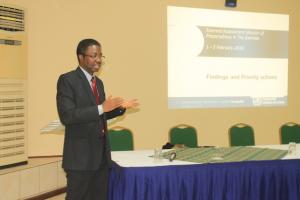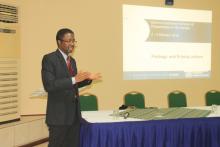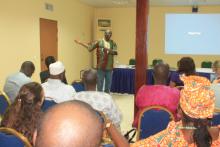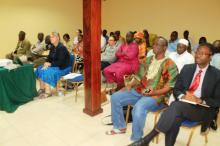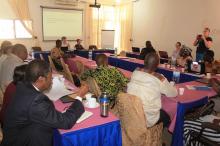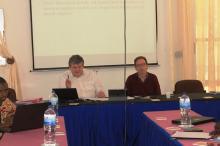Gambia conducts a Joint external assessment of health sector all hazard emergency preparedness and response: January 30 – February 05, 2016
The unprecedented Ebola Virus Disease (EVD) outbreak in West Africa spurred many countries in the Region to review their level of preparedness and to accelerate capacity building to enable prompt and effective action. Donors around the world rallied to support countries in these efforts.
The Gambia developed a national EVD preparedness plan, which was implemented under the oversight of the National Task Force (NTF). The NTF brought together all partners to ensure that actions taken in the country were well coordinated, and supported the national plan.
An external assessment exercise, comprising members from Public Health England (PHE), the Robert Koch Institute (RKI), World Food Programme (WFP), Office for the Coordination of Humanitarian Affairs (OCHA), and World Health Organization Headquarters and Regional Office was conducted from January 30 – February 05, 2016. This joint assessment mission was con-ducted so as to review progress in preparedness for any hazard, building upon what was learnt through the EVD preparedness plan.
After conducting the monitoring mission, the team drafted a report on the status of each outcome, demonstrated by relevant indicators, as well as challenges faced in achieving outcomes. The report highlights the findings of the assessment, elaborates recommendations and identifies action points regarding major issues and problems affecting progress to date.
The assessment report recognises the fact that significant gains have been made in preparedness for public health emergencies through the work conducted for Ebola preparedness in Gambia. There are many aspects of prepared-ness that are already very well advanced, for instance the strength of existing community engagement is to be com-mended. The keenness to develop the health sector emergency preparedness and response plan, and the progress made in providing an evidence-base on which to plan through the identification of priority risks, collation of documents, and an action plan is also to be applauded.
An action plan outlining the potential next steps was developed with MoHSW and the WHO country team. It is recommended that a task force of key staff in the MoHSW from national and regional levels, and partners should be formed to review these suggested actions and to prioritize these, making sure they are in line with the implementation of the forth-coming health sector emergency preparedness and response plan. A costed combined action plan with key indicators for monitoring should then be developed and submitted to financial partners.
The lessons learnt from this successful one country, one plan approach are currently being utilized for the development of the national health sector emergency preparedness and response plan, which will be streamlined with the national disaster plan. This comprehensive approach will enable the country to best utilize its resources to ensure the health security of its population.
___________________________________________
For more information, please contact:
Mr Momodou Gassama, Health Promotion Officer, gassamam [at] gm.afro.who.int (gassamam[at]gm[dot]afro[dot]who[dot]int) (+220)- 4462286
Mr George. Williams, Health Information Assistant, williamsg [at] gm.afro.who.int (williamsg[at]gm[dot]afro[dot]who[dot]int) (+220) 4462284



